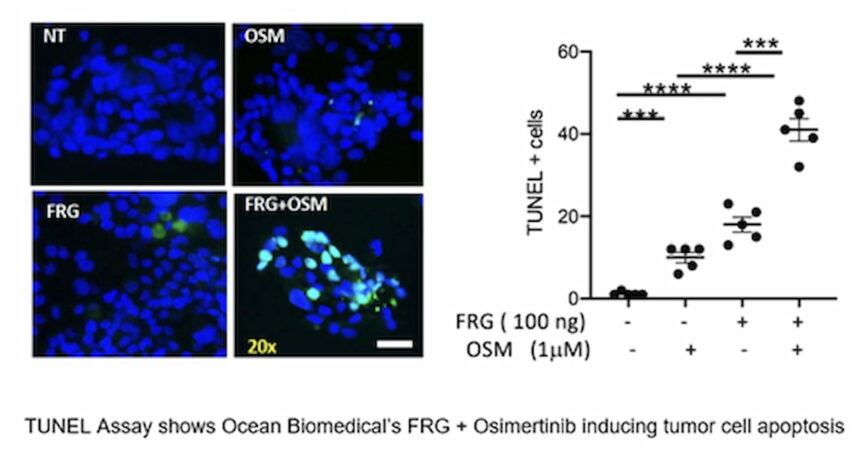Ocean Biomedical, Inc. (NASDAQ: OCEA), a biotechnology company that operates by partnering with leading researchers to accelerate new discoveries in the healthcare sector, on Tuesday said its cancer-targeting immunotherapy antibody candidate has shown effective tumor reduction against an aggressive subset of Non-Small Cell Lung Cancer (NSCLC) with Epidermal Growth Factor Receptor (EGFR) mutations.
Ocean’s executive chairman and founder Dr. Chirinjeev Kathuria said, “This new data that demonstrates tumor suppression and potential salvage therapy application in EGFR-mutation lung cancers could save thousands of lives. We are proud of this pioneering work by Dr. Elias and his colleagues at Yale and Brown.”
Key Findings
The findings are probably the most important the company has announced so far. Generated by Ocean’s scientific co-founder Dr. Jack A. Elias and colleagues from Yale University and Brown University, these findings were first published as a preprint last week in bioRxiv. They are the first to uncover the role of Chitinase 3-like-1 (CHI3L1) in the pathogenesis of EGFR-mutant cancers, with potential applications not just in NSCLC, but in all EGFR-mutant cancers, including glioblastoma and colon cancer.
“We are very excited to see the effectiveness of our anti-CHI3L1 antibody in suppressing and reversing tumor growth in studies of EGFR-mutant lung cancer cells. We are even more amazed to see how it works in combination with current treatments like Osimertinib, especially its ability to restore therapeutic effectiveness in cells that have developed Osimertinib resistance,” said Dr. Elias.
Ocean Biomedical said that the studies demonstrated the ability of its cancer-targeting immunotherapeutic antibody to control the growth of human tumor cells with EGFR mutations by suppressing CHI3L1 activity. The findings also demonstrate a stunning ability to restore therapeutic sensitivity to current tyrosine kinase inhibitor (TKI) therapies after resistance sets in, including the third-generation TKI, Osimertinib (marketed as Tagrisso by AstraZeneca).
“The range of potential therapeutic applications in our cancer platform continues to grow, and we look forward to growing the benefits for all of Ocean’s stakeholders,” commented Suren Ajjarapu, one of Ocean’s directors.
Mouse-Model Testing
In mouse-model testing, in combination with Osimertinib (and also earlier TKI Gefitinib), the company’s antibody was shown to stop human tumor progression by inducing tumor cell death and stimulating tumor suppressor genes. Last year, AstraZeneca’s top pharmaceutical product by revenue was Tagrisso, a medication used in the treatment of non-small-cell lung carcinomas. Tagrisso generated 5.44 billion US dollars in revenue for the company in 2022.
Ocean’s CEO Elizabeth Ng said, “We are excited to expand our understanding of the role of CHI3L1 in driving tumor formation, and to discover this potential role for application in combination with current state-of-the-art therapies, especially in EGFR-mutant NSCLC, which is devastating for so many families and disproportionally affects Asian heritage populations.”
R&D Update
Ocean’s cancer immunotherapy candidate demonstrates potential use in EGFR-mutant cancer immunotherapy in multiple ways: as a stand-alone therapy; as a combination therapy with current TKI inhibitors; and as a “salvage therapy” in combination with TKI inhibitors like Osimertinib — potentially extending their therapeutic life. The company will be hosting an R&D Update to discuss details of its cancer program, including the findings, and to answer investor questions on Thursday, October 19, 2023, with Dr. Jack A. Elias.






